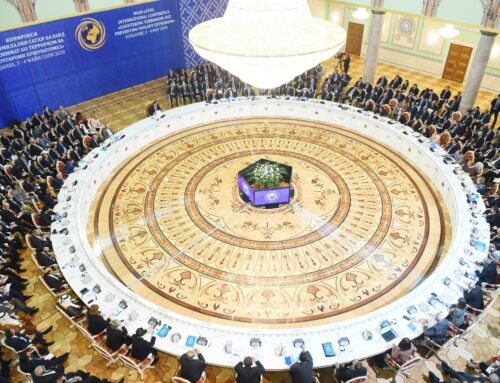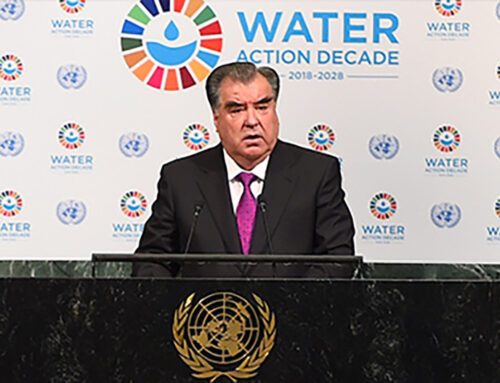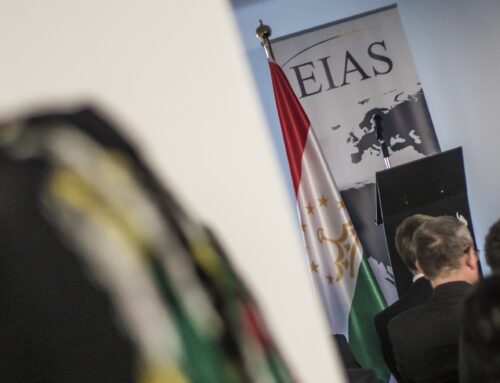
Emomali Rahmon, Tajikistan’s democratically elected president since 1994, has led his country from the disaster of civil war to today’s peace and prosperity. Having served in numerous high-level leadership posts before he became president, Emomali Rahmon was named an official “Hero of Tajikistan” by the nation’s parliament in 1999. He has gained the respect of leaders worldwide for his commitment to ending conflict and building the foundations of a sustainable, internationally oriented economy which can ensure high quality of life for the people of Tajikistan.
“We have established the rule of law, secular government, democracy, stability, and a market economy with great development potential in which economic freedoms and private property are protected.”
Early in his tenure as president, Emomali Rahmon established his policy of promoting peaceful dialogue as the key means to achieving stability. As he points out, “Our political ideal is national unity. We are not going to settle the principal problems of our society by force or armed conflict.”
Emomali Rahmon works tirelessly to enhance Tajikistan’s international reputation and to make sure the country plays a positive role in regional and global affairs. Under his administration, Tajikistan has signed the UN Charter, the Helsinki Final Act, the Paris Declaration and other international treaties. The president has addressed the UN several times, drawing the world’s attention to such issues as the problems in Afghanistan and the need to combat terrorism, extremism, drug trafficking, a lack of adequate supplies of clean water and other challenges. Based on a proposal the president made, the UN declared 2003 the “International Year of Freshwater”, the period 2005 to 2015 the “International Decade for Action: Water for Life”, and 2013 the “International Year of Water Cooperation”. Emomali Rahmon has received awards from many countries for his far-sighted leadership. He discusses his vision for Tajikistan.
European Times: What image would you like the world to have of Tajikistan?
Emomali Rahmon: I would like people to know that we have established the rule of law, secular government, democracy, stability, and a market economy with great development potential in which economic freedoms and private property are protected. I can confidently say that Tajikistan’s institutional transformation, which has totally altered the economic and social life of our people, has borne fruit. We have created favourable conditions to tap our country’s great resources and have laid a solid foundation for entrepreneurial activity.
We have privatised most state property, implemented new laws to protect economic freedoms, reformed registration and licensing procedures, abolished many administrative barriers, declared a moratorium on the inspection of business activity, and fought against crime and corruption, all of which have improved our business climate and investment appeal. These efforts were recognised in the World Bank’s “Ease of Doing Business” report, in which Tajikistan was ranked among the world’s top 10 countries in business reforms for two straight years.
Our Consultative Council on Improving the Investment Climate, which offers a forum for fruitful dialogue between government and the private sector, continues to upgrade our business environment. We are making great progress in reaching three main goals: energy independence, ending the country’s communications isolation and ensuring food security.
European Times: How would you define Tajikistan’s relationship with the EU?
Emomali Rahmon: Tajikistan regards the EU as a major international partner and is interested in furthering the development of beneficial relations with the EU under the framework of the EU Strategy for Central Asia for 2007 to 2013 and beyond. In 2009 Tajikistan became the first Central Asian country to sign a cooperation agreement with the European Investment Bank, and in 2010 the Partnership and Cooperation Agreement between Tajikistan and the EU entered into force.
High on our agenda in our cooperation with the EU are energy and communications, water management, environmental protection, trade and investment, border management, mine clearance, Tajikistan’s World Trade Organisation membership negotiations, drug-trafficking, education and health, the expansion of the democratisation process and ensuring the rule of law.
We welcome EU investors in Tajikistan, for example in our hydropower-development projects. We would also like to foster cooperation between EU research centres and Tajikistan in such fields as iron ore, hydrology, hydropower, meteorology, environmental issues, climate change, road construction, communications, the global economy and language training. We would like to see the establishment of a European high school in Dushanbe, and we strongly support the EU’s border management and drug-action (BOMCA/CADAP) programmes.
European Times: What would you like to highlight concerning Tajikistan’s investment potential?
Emomali Rahmon: Tajikistan has established an ‘open door’ policy to facilitate broader and mutually beneficial cooperation with investors from all over the world, and we have carried out a number of reforms to improve the business climate, increase protection for investors, and provide investment incentives. Our priority sectors for investment are hydropower, infrastructure and projects to ensure food security, all of which will not only benefit Tajikistan but also the surrounding region. For example, we are capable of producing 527 billion kWh of energy, but are only producing 5% of this total now. Tajikistan has the potential not only to supply our own domestic needs but also to export cheaper, greener energy to Afghanistan and other countries in Central and South Asia.
Other fields where we encourage investment include aluminium production, cotton processing, food processing, mining, the chemicals industry and tourism. Tajikistan offers raw materials and favourable economic and legal conditions as well as a number of free zones, while the EU can bring in the technologies and know-how we need.
European Times: What are Tajikistan’s most important accomplishments since independence?
Emomali Rahmon: Twenty years ago, the Tajik people had the honour of witnessing an historic achievement: the independence of their country, whose history stretches back 1,000 years. Thanks to its independence, the Republic of Tajikistan is recognised as a member of the world community and Tajikistan can now independently define its internal and foreign policies. Conflict stirred up by a hostile group resulted in civil war, but soon the forces of reason within our society chose the path of peace and national reconciliation. After five years of confrontation, the General Agreement on the Establishment of Peace and National Accord in Tajikistan was signed in 1997. This was a unique achievement by the Tajik people.
Over the past 20 years, Tajikistan has built a democratic state governed by secular principles and the rule of law. We have adopted a new constitution based on a referendum and we have established a civil society. Today, eight political parties function freely and five of them have seats in parliament. We also have 2,360 nongovernment organisations whereas in 1992 we had 141, and we have a free press and more than 400 newspapers and magazines, compared to 139 in 1991, of which only four were privately owned. Tajikistan now has its own flag, state emblem, national anthem, national currency, armed forces and the Border Guard Force, which has been ensuring border security since 2005. We have reduced poverty and implemented more than 150 investment projects valued at more than €20.5 billion (TJS120 billion).
The government of Tajikistan is determined to ensure stable economic development, strengthen the country’s export potential, improve the investment climate, protect business, provide social security for the population, improve the labour market and enhance human development. The government intends to use all the country’s potential and resources to achieve 5% to 8% economic growth over the next five years and lay solid foundations for the continued stable development of the country and the further enhancement of our people’s living standards.
European Times: What is Tajikistan’s position on the current situation in Central Asia and Afghanistan?
Emomali Rahmon: In terms of security and stable development, the situation in our neighbour Afghanistan is of great importance for us. Tajikistan, with 1,400 km of shared border with Afghanistan, is a defense shield not only for Central Asia but also for European countries, and it is in the front line in fighting terrorism, drug smuggling and arms smuggling. Tajikistan has spent many years combating these global threats and plays a crucial role as a buffer. I have suggested that an international conference should be held in Dushanbe under the auspices of the United Nations Office on Crime and Drugs with the participation of interested countries and international organisations. The world community should realise how heavy a burden Tajikistan has taken on. We need support and assistance in securing the border.
Tajikistan’s Drug Control Agency, supported by the UN, is one example of fruitful cooperation between our country and international partners. Between 2001 and 2011, Tajikistan’s drug-control forces seized more than 70 tonnes of drugs, including more than 30 tonnes of heroin, which is equivalent to saving the lives of more than 37 million people around the world. We hope that the EU and its member states, along with our international partners, will expand cooperation with Tajikistan in this area, as well as in combating terrorist extremism and organised crime.
As for Afghanistan, both non-military and military action is required. Experience shows that such problems cannot be solved militarily. Tajikistan welcomes the chance to work with the EU to foster Afghanistan’s economic and social development. The settle-ment of the conflict in Afghanistan requires broad regional cooperation, which is one of Tajikistan’s strategic priorities. I believe that there is no problem in Central Asia that cannot be solved by good will and constructive cooperation between neighbours. This is true of the water and energy problems, now on everybody’s lips, and the key to solving problems can be expressed in one word: cooperation. We hope that, within the framework of its Strategy for Central Asia, the EU will pay great attention to boosting cooperation between the countries of the region, strengthening the atmosphere of trust and encouraging the movement of capital and visits between peoples.
We welcome the chance to boost our trade with Afghanistan, which grew by 60% in 2011 compared to 2010. We now have a fifth bridge over the Panj river to Afghanistan and the two countries share the 220 kWh Sangtuda-Puli Khumri power transmission line through which Tajikistan can export electricity. Tajikistan and the EU have a common viewpoint on the stability and security of Afghanistan. We urge the EU and NATO to engage in greater and deeper cooperation with neighbouring countries, including Tajikistan, in order to solve Afghanistan’s problems.
We believe that the development of a peace plan in Afghanistan should be focused on the economic, social, educational and cultural fields. The countries of our region are not just connected to each other by borders. We have a shared history, a joint cultural heritage and ancient trade ties from the period of the Great Silk Road that unite us. We should not forget that politicians come and go, but our nations must coexist as good neighbours in a climate of friendship, peace and stability, with favourable conditions for visits, the free exchange of production and workforces, and the transparency of borders.
European Times: Can you discuss your projects to ensure adequate supplies of clean water?
Emomali Rahmon: In 15 to 20 years, Central Asia will have a significant problem in providing adequate drinking water. In 2007 I made a proposal for a project designed to provide Central Asian countries with drinking water from Lake Sarez, which contains 17 billion cubic metres of pure fresh water. Lake Sarez is around 600 km from the borders of neighbouring countries. This is an achievable project if financing can be found. In our water projects, we aim to avoid such problems as the Aral Sea project, which took most of the water from the sea with disastrous effects on the local environment.
We are convinced that national interests and common regional interests should be balanced in solving water and energy issues. So that other countries can benefit from Tajikistan’s water resources, we need to build hydropower facilities as well as improve irrigation systems throughout the region, most of which are outdated. Other countries in the region have resources Tajikistan does not have, including oil, gas and coal; we have the water they need, yet we are currently short on electricity supplies for our own people, in part because we have signed agreements to supply water to downstream countries. We have proposed that Central Asian countries work together to develop water and energy systems. We are convinced that the implementation of the EU’s new energy strategy will promote the strengthening of cooperation in Central Asia, particularly in water management, the free movement of people and capital, and protection of the environment.
“Over the coming five years, we plan to speed up the development of industry, energy, transport and communications, and agriculture, as well as stimulate the private sector and increase state revenues to fund social programmes.”
European Times: Why is peace in Tajikistan important for the rest of the world?
Emomali Rahmon: Tajikistan celebrates National Unity Day on June 27, and this year’s celebratio marked 15 years of peace in our country. Our National Reconciliation Commission established peace and national accord in only two and a half years. This accomplishment has helped to bolster the image of Tajikistan in the international arena, since the Tajik peace experience is instructive for the global community as well as for countries plunged into domestic conflict. I think that officials involved in the peace process in Afghanistan, Iraq and Syria can draw lessons from some aspects of the Tajik peace experience, which was recognised by UN resolutions as a model for conflict settlement.
European Times: What is your vision for Tajikistan’s economy over the next five years?
Emomali Rahmon: We are drafting our medium-term economic development strategy for 2013 to 2015 with the help of international partners. Priorities are to increase public-private cooperation, attract domestic and foreign investors, enhance the role of the private sector, and generate sustainable development. In 2011, more than 1,000 new enterprises were established in Tajikistan, including around 100 industry operations which created a total of 12,000 jobs. We will continue to pursue reforms, including of the licensing process, and we aim to establish a ‘Single Window’ for imports and exports.
Over the coming five years, we plan to speed up the development of industry, energy, transport and communications, and agriculture, as well as stimulate the private sector and increase state revenues to fund social programmes. Over the medium term, we plan to build 70 small hydropower plants and to complete the Sangtuda hydropower plant and the restoration of the Rogun plant. We will continue to work to attract investment and we plan to implement more than 100 joint investment projects valued at a total €2.2 billion (TJS13 billion) between 2012 and 2014. We welcome the participation of European individuals and companies in our economic-development projects. Tajikistan has great confidence in the future of beneficial cooperation and strategic partnerships with the EU and its institutions.




